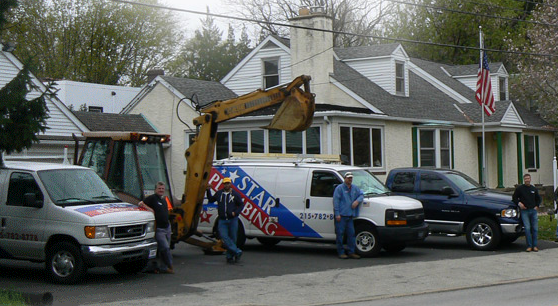Why Is Cast Iron The Best Choice For Pipe Fittings?
Cast iron is a durable and strong material commonly used for pipe fittings. Its high strength and resistance to corrosion from water make it a popular choice for plumbing applications. Cast iron is also highly resistant to wear and tear, making it an ideal material for long-term use in plumbing systems. It is also relatively inexpensive, easy to install, and can withstand high pressures, making it an economical option for many projects. Additionally, cast iron can easily be molded into various shapes and sizes, making it a versatile material that can be used in a variety of plumbing applications.
Why Is Cast Iron Used For Pipe Fittings?
Plumbing is an important aspect of any construction project, and the quality of the pipes and fittings used can make a significant difference in the longevity and performance of the system. Cast iron has been used for pipe fittings for centuries due to its durability, strength, and fire resistance. In this article, we will take a look at why cast iron is an ideal material for pipe fittings, types of cast iron pipe fittings available, installation steps for cast iron pipe fittings, advantages, and disadvantages.
Benefits of Using Cast Iron for Pipe Fittings
Cast iron is an incredibly strong material that can withstand tremendous amounts of pressure over a long period of time. It has a high melting point that makes it suitable for use in areas where there is a likelihood of fire or extreme heat. This makes it ideal for use in industrial settings such as factories or even in residential homes where safety is important. It is also much more cost-effective than other materials such as copper or brass due to its low cost per unit weight.
Cast iron also has excellent corrosion resistance properties which make it suitable for use in areas with high levels of moisture or humidity. The material is also resistant to wear and tear which makes it ideal for use in areas where there are frequent changes in temperature or pressure levels such as in plumbing systems.
Types of Cast Iron Pipe Fittings
Cast iron pipe fittings come in many different types including elbows, tees, couplings, flanges and unions. Elbows are used to make turns while tees are split into three sections to form T-shaped joints between pipes. Couplings are used to connect two sections of pipe together while flanges are used to seal two sections together. Unions are used when the two sections need to be separated easily but securely without having to cut the pipes themselves.
Installation Steps For Cast Iron Pipe Fittings
When installing cast iron pipe fittings you will need several tools including wrenches, screwdrivers, hammers and chisels. You should also wear protective gear such as gloves and eye protection when working with these materials as they can be sharp if mishandled. First you need to measure the area where you want to install your fitting so that you can buy the correct size fitting for your needs. Once you have your fitting you need to cut away any excess material so that it fits snugly against the wall or floor surface where it will be installed. You then need to ensure that all surfaces are clean before applying lubricant around all joints before finally securing them tightly with bolts or screws depending on what type of fitting you have chosen.
Advantages Of Using Cast Iron Pipe Fittings
Using cast iron pipe fittings has several advantages including being easy to install due their low weight compared to other materials like copper or brass which can be very heavy and hard to maneuver around tight corners easily during installation processes. They are also much more economical than other metal options due their low price points making them suitable even for large scale projects that may require a large number of fittings over a short period of time without breaking the budget excessively .
Disadvantages Of Using Cast Iron Pipe Fittings
The main disadvantage associated with using cast iron pipe fittings is that they can rust over time if not properly maintained . This means that regular maintenance such as cleaning out any debris from inside the pipes must be done regularly if you want them perform at their best over long periods . Additionally , these types of pipes tend not be as flexible compared with other materials like PVC plastic which means they may not fit into tight spaces as well .
Why Is Cast Iron Used For Pipe Fittings?
Cast iron is a popular material for pipe fittings due to its durability and affordability. Cast iron has long been a mainstay of plumbing systems and can be found in homes, businesses, and industrial sites. Its strength and corrosion resistance make it an ideal choice for many applications, including drainage systems, water systems, and other plumbing projects.
Cast iron is an alloy of iron and carbon that is heated to high temperatures to form a strong material. It also contains trace amounts of silicon, manganese, phosphorus, sulfur, copper, chromium, nickel, molybdenum, vanadium and tungsten. These trace elements are what give cast iron its superior strength and corrosion-resistant properties.
The durability of cast iron makes it ideal for long-term use in plumbing applications. It can withstand extreme temperatures without cracking or breaking apart like some other materials can. In addition to its underlying strength, cast iron also resists corrosion from water exposure better than some other materials like copper or PVC pipes. This makes it well suited for use in drainage or water systems that are exposed to the elements over time.
Maintenance Tips for Cast Iron Pipe Fittings
In order to ensure optimal performance from your cast iron pipe fittings over time, regular maintenance should be done on them. This includes cleaning the fittings regularly with a mild detergent solution or using corrosion control products specifically designed for use on cast iron pipe fittings. This will help keep rust at bay while also helping the fittings stay in good condition over time.
It’s also important to check the connections of your cast iron pipe fittings periodically to make sure they’re properly secured together so that they don’t leak or create any cracks in your pipes over time. Also inspect the fitting itself to make sure there are no signs of damage that could lead to further problems down the line if left unchecked.
Common Applications For Cast Iron Pipe Fittings
Cast iron pipe fittings can be used in a variety of different applications including drainage systems such as those found in homes and businesses as well as larger scale industrial projects such as water treatment plants or hydroelectric dams. They are also commonly used in sewer lines due to their resistance to corrosion from wastewater exposure which helps them retain their structural integrity over time despite frequent contact with corrosive substances like sewage materials or runoff from agricultural land nearby.
Popular Brands Offering High Quality Cast Iron Pipe Fittings
When looking for high quality cast iron pipe fittings there are many trusted brands available on the market today such as Merit Brass, Nibco and Charlotte PVC who all offer reliable solutions for all types of plumbing projects that require durable yet affordable solutions. All three of these companies have been around since the early 1900s when they first began producing cast iron pipes with superior reliability compared to other materials at the time and they continue this tradition today with their line of high quality products that meet all necessary industry standards while still offering competitive pricing options when compared against other brands on the market today.
Finding Professional Assistance With Installing Cast Iron Pipe Fitting
When it comes time to install your new cast iron pipe fitting it’s always best practice to seek professional assistance from a qualified plumber or contractor who has experience working with this type of material specifically rather than trying DIY methods which could lead to potential issues down the line if not done correctly by someone who knows what they’re doing when it comes installing these types of fixtures properly according local building codes and regulations set forth by local governing bodies in order ensure safety during installation as well as proper operation afterwards once complete.
FAQ & Answers
Q: What are the benefits of using cast iron for pipe fittings?
A: Cast iron is a popular choice for pipe fittings due to its durability, strength, and fire resistance.
Q: What types of cast iron pipe fittings are available?
A: Common types of cast iron pipe fittings include elbows, tees, and couplings.
Q: What are the installation steps for cast iron pipe fittings?
A: Installing cast iron pipe fittings requires the right materials and specific steps. This typically includes cleaning the pipe, tightening bolts and nuts with a wrench, applying sealant or lubricant as needed, and making sure all connections are tightened properly.
Q: What are the advantages of using cast iron pipe fittings?
A: Cast iron is an economical option for many projects, and is also relatively easy to install. It also offers good resistance to pressure and can be used in many different applications such as drainage systems and water systems.
Q: How can I find professional assistance for installing cast iron pipe fitting?
A: To ensure proper installation it is best to consult a plumbing contractor or refer to local building codes. There are also many popular brands that offer high quality cast iron pipe fittings such as Merit Brass, Nibco, and Charlotte PVC.
Cast iron is an excellent material for pipe fittings due to its superior durability and strength. It is able to withstand high temperatures, corrosion and pressure, as well as heavy loads. This makes it ideal for large-scale plumbing systems that need to be able to transport large volumes of water or gas. Cast iron is also relatively inexpensive compared to other materials, making it a cost-effective solution for plumbing projects. In addition, cast iron has a long life expectancy, meaning that it can be used for many years without having to replace the pipes or fittings. All of these factors make cast iron the perfect material for pipe fittings and make it an essential part of any plumbing system.
Author Profile

-
Star Plumbing, located in Elkins Park, PA, is a full-service plumbing company owned and operated by Mitchell Gordon. Since its inception, Star Plumbing has been providing its customers with reliable, quality plumbing services.
The Star Plumbing website offers informative articles on DIY plumbing and plumbing equipment, offering readers helpful advice and tips on how to take care of their own plumbing needs. This is a great resource for those who are looking to tackle a plumbing project themselves, as it provides useful information and advice on how to safely and successfully complete a plumbing job. Additionally, the website provides detailed descriptions of the various plumbing tools and equipment that are available, as well as detailed instructions on how to use them.
Star Plumbing’s website is a great resource for anyone with plumbing needs. Whether a customer is looking for advice on how to take care of their own plumbing or to schedule service from Star Plumbing, the website offers helpful advice and information for all their plumbing needs.
Latest entries
- April 12, 2024Plumbing Equipment And AccesoriesI Tested And Ranked The Best 10 Inch Rough In Round Toilet In 2024: And Here’s What I Found
- April 12, 2024Plumbing Equipment And AccesoriesI Tested And Ranked The Best Stone That Cleans Toilets In 2024: And Here’s What I Found
- April 12, 2024Plumbing Equipment And AccesoriesI Tested And Ranked The Best Heat Tape For Plumbing In 2024: And Here’s What I Found
- April 12, 2024Plumbing Equipment And AccesoriesI Tested And Ranked The Best Kaboom Toilet Bowl Tablets In 2024: And Here’s What I Found
